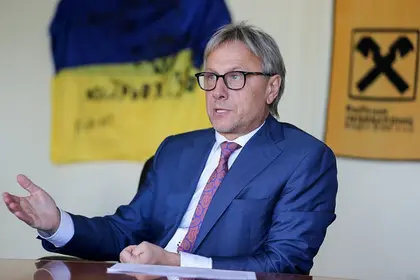Volodymyr Lavrenchuk is chairman of the board of Raiffeisen Bank Aval in Ukraine, the nation’s 5th largest bank with an estimated $1.9 billion in assets and largest foreign lender. Its parent company is Austrian-based Raiffeisen Bank International. Ukraine’s division went from losing $290 million in 2014 to a net profit of $142 million in 2016, a remarkable turnaround that has made it one of Ukraine’s most profitable banks.
- Examine the most contemporary Ukraine news that came out today.
- View the most recent Ukraine news pieces that came out today.
Lavrenchuk has won numerous awards, including in 2014 winning Investgazeta’s top rating of Ukrainian bankers for communication with journalists and clients. The bank’s record profitability is showing in its increased visibility in the community, through advertising and sponsorship of such events as the Austrian Film Festival on April 19–23 in Kyiv.
He agreed to a blitz interview with the Kyiv Post on April 20.
KP: You’ve been touted as a candidate for National Bank of Ukraine governor to replace Valeria Gontareva, who resigns in May. Is this something you’d be interested in doing?
VL: “The answer is yes when the time will come.”
KP: How did the financial turnaround of the last three years happen? Was the 30 percent equity stake of the European Bank for Reconstruction and Development essential?
VL: “We learned lessons from the crisis in 2008–09. We made a change in our strategy: We adopted a strict credit policy which prevented the creation of new risks. At the same time it allows us to increase the loan book in 2016 higher than any other bank in Ukraine. The second one was adjusting the size of the bank to the market, changing the operational model. A new organizational structure and lean methodology helped to materially improve the efficiency. We were very positive about 2016 and made a record profit. EBRD is our shareholder. Our close to 50 percent of nonperforming loans was developed in during the crisis of 2008–09. It requires years to clean that up.”
KP: How is it possible for Ukraine to have bank fraud that will cost taxpayers $20 billion and no prosecutions for bank fraud? How can a banking system be truly reformed if a nation cannot punish bank fraud?
VL: “It’s a very right question. A number of questions (need to be answered) to implement effective tools in collection of money for those banks that are closed, yet assets and money are not collected. To my information there are actions being implemented now to increase collection results to compensate clients losses. Not every thing should come from the budget. The task is very actual. Infrastructure is being developed.”
KP: Why do we still have high-interest ranks and no lending — is it because of a lack of creditor rights, what are the other reasons?
VL: “Creditors rights should be improved, making collateral registers and claims effective. At this stage, it’s still not yet. A moratorium on (payment of) real estate has been set for housing mortgages years ago. With a moratorium, mortgage lending cannot grow fast.”
“A second block of questions is the clients’ solvency. So we know that the population lost income because of the crisis and their ability to pay the money back is lower, so we should take this into account. Obviously, there’s not enough capital for companies that lost money. It requires additional capital into companies to be done by investors. The entire environment requires a good investment climate and stimulus.
“No. 3 is the know-your-customer principle (and adoption of) financial monitoring requirements to bring transparency: market players/companies need to clean their charters, disclose their ownership and follow the know-your-customer principles.”
You can also highlight the text and press Ctrl + Enter




